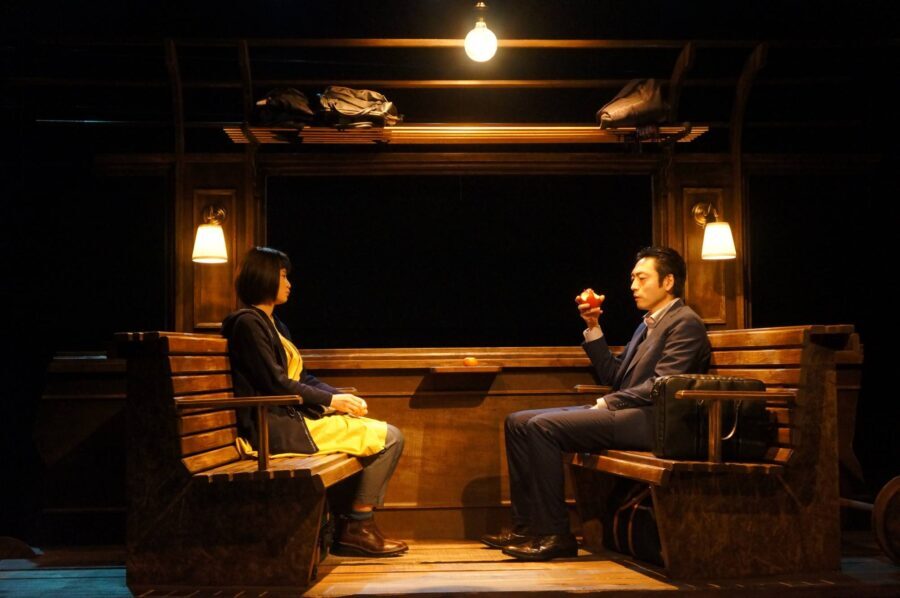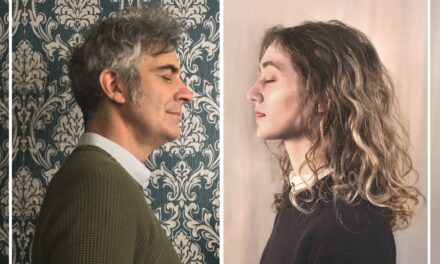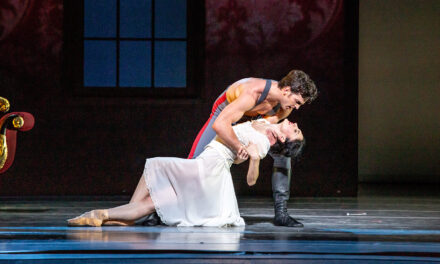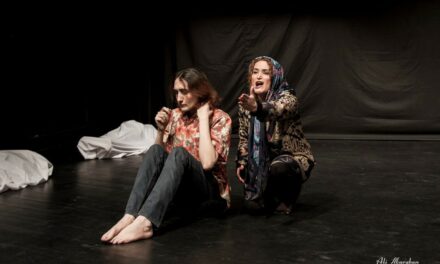With its picturesque hills and coasts, as well as wetlands that serve as breeding grounds for rare kо̄notori (Oriental storks), Tajima was hoping to see an influx of tourism this year before the pandemic hit. Now locals are hoping the two-week festival will help entice visitors back to the area. Performances will be held at various venues in and around the small city of Toyooka after which the event is named.
Hirata’s Seinendan theater company used to be based at the small Komaba Agora Theater in Tokyo’s Meguro Ward, a venue his father established in 1984 by renovating the family home. Hirata relocated Seinendan to Toyooka last year, declaring that he was starting the “final adventure of (his) career.”
Before the big move, however, the playwright and director had already opened the Kinosaki International Arts Center in Toyooka in 2014 as a place for performers, visual artists, and other creatives from around the world to stay for free for up to three months to concentrate on developing and showcasing their work.
Following that venture, he launched theater workshops for teenagers and children in the area and opened Seinendan’s new Ebara Riverside Theatre just in time for the festival. Converted from an old municipal office building with the help of a crowdfunding project that called for 10 million (but ended up receiving almost 50 million), the theater is intended to be, in Hirata’s words, “both Seinendan’s base from which to reach out to the entire world and the community’s cultural hub, with free admission for people under 18.”
In April next year, Hirata will open a public university specializing in arts and tourism, one in which all students will be required to study theater. He also hopes to establish a residential youth theater company.
Hirata never expected, though, that a global pandemic would nearly upend the plans for his dream festival. His aim of holding an international theater event — much like Avignon’s — had to be adjusted, however, with the focus switched to a domestic lineup.
Among the remaining 11 programs are three Seinendan standouts directed and penned by Hirata: A Long Night in the Tropics, centered on the complex human relationships among elderly Japanese expats in Malaysia; The Yalta Conference, a comedy of sketches that riffs off the titular 1945 meeting at which American, British and Soviet leaders reorganized postwar Germany and Europe; and Some Forgotten Dream, a dialogue-based drama in which three passengers on a night train wax nostalgic about their shared history.
There will also be a rerun of Satoko Ichihara’s 2019 Aichi Triennale sensation and winner of this year’s Kishida Drama Award, The Bacchae: Holstein Milk Cows, which works off the themes of Euripides’ Greek tragedy, The Bacchae, to examine female sexuality and the significance of reproduction. The dramatic play includes a character who is half-human, half-cow, and a sex club called Happening Bar where “anything goes,” and hopes to challenge audiences with its take on the vacuity of a male-dominated society.
The festival will also host the world premiere of Zero, a new opera by Hirata on the theme of life and death that will be staged with music by New York-based composer Kaito Nakahori.
In addition to these theatrical highlights, the festival will also feature six plays — including three by former Seinendan members Hideto Iwai, Junnosuke Tada, and Shiro Maeda — along with 24 fringe programs from theater to dance, street performances, installations, and workshops.
General admission tickets were not made available until Aug. 20 to minimize the risk of disappointing buyers if the festival was canceled due to coronavirus-related concerns. Hirata acknowledges, however, that “the worst could still happen.”
“Of course, we are following official requirements, but lots of tourists are now coming back to Kinosaki, and hotels and shops are opening with social distancing and hygiene measures in place,” Hirata says via video chat. “I couldn’t see why theaters should stay closed.”
To prioritize safety, the festival organizing committee plans to do more than reducing all seating to below half-capacity, enforce social distancing, and provide hygiene facilities. They also will ask audiences to refrain from hugging or talking in auditoriums and to stay at least two meters from the stage. Artists and staff must also spend two weeks in quarantine or provide proof of a negative PCR test prior to taking part in the festival.
“I know there is no such thing as zero risk,” Hirata says, “but we dare not cancel the festival because artists need places where they can perform — places that are, of course, as safe as possible.
“To that end, we are asking audiences to refrain from chatting after performances and going out afterward in big groups. Obviously, those are some of the delights of regional festivals, but we all need to hold back this year.”
Then, pointing out there are no known COVID-19 cases in the locality, he adds that Toyooka Mayor Muneharu Nakagai recently said that “theater and the arts are attractions for tourists like food, nature and sports events, so it’s nonsense to leave them out.”
Despite this sentiment, there are undeniable risks of contagion when people from many places gather together, especially if they come from Tokyo, Osaka, or other hotspots. How does Hirata feel about that?
“Tajima is quite safe, with limited ways to come in and out of the area,” he says. “If people are still worried and willing to pay 35,000 to have a PCR test before coming, they can visit without anxiety — although I wish the tests were really cheap, like in Taiwan, South Korea, and even Nagasaki and Setagaya Ward in Tokyo.”
“In the end, everyone has to make up their own mind whether to come to our festival. I think it’s ideologically a threat to creative expression if nations simply impose self-restraint or cancel all arts events because of the pandemic. It’s better to proceed on a case-by-case basis.”
This article was originally posted in The Japan Times on September 3d, 2020, and has been reposted with permission. To read the original article, click here.
This post was written by the author in their personal capacity.The opinions expressed in this article are the author’s own and do not reflect the view of The Theatre Times, their staff or collaborators.
This post was written by Nobuko Tanaka.
The views expressed here belong to the author and do not necessarily reflect our views and opinions.


















